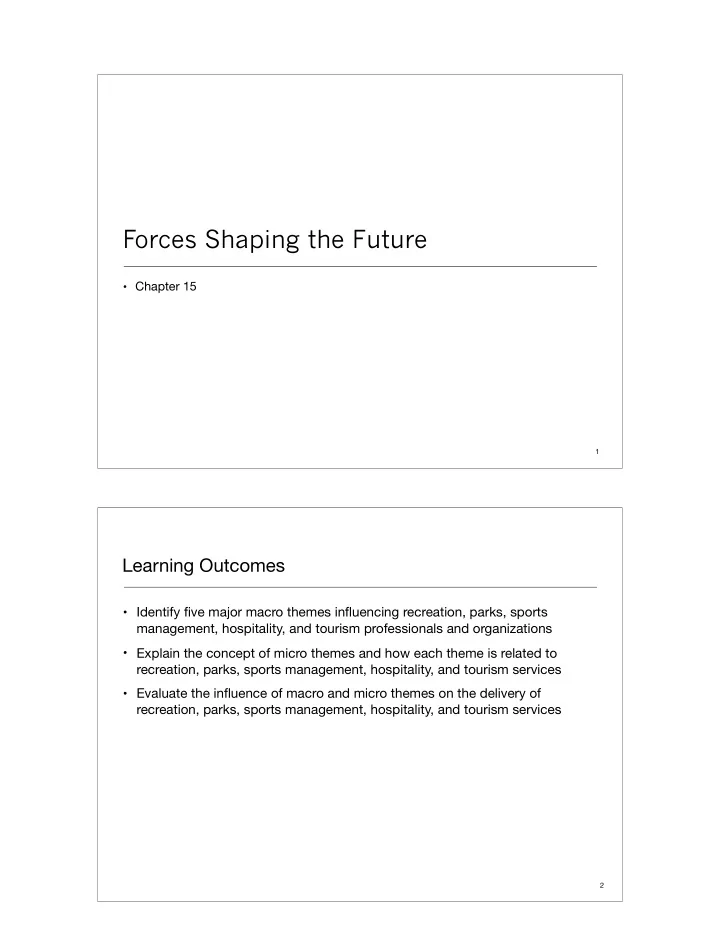

Forces Shaping the Future • Chapter 15 1 Learning Outcomes • Identify five major macro themes influencing recreation, parks, sports management, hospitality, and tourism professionals and organizations • Explain the concept of micro themes and how each theme is related to recreation, parks, sports management, hospitality, and tourism services • Evaluate the influence of macro and micro themes on the delivery of recreation, parks, sports management, hospitality, and tourism services 2
Learning Outcomes cont. • Describe and explain how servant leadership and advocacy are important roles for recreation, parks, sports management, hospitality, and tourism professionals and organizations • Identify four guidelines for action for recreation, parks, sports management, hospitality, and tourism professionals in assuring individual freedom and responsible community leisure engagement • Evaluate the importance of why recreation, parks, sports management, hospitality, and tourism professionals must be environmentally and socially conscious leaders in the future 3 Forces Shaping the Future • DIVERSITY • Consider incorporating a pluralistic framework • Early 21st Century influx of immigrants: 60% of net increase in minority population due to immigration • Leisure has potential of ameliorating social conflict and fostering community cohesion • By 2019, no single racial or ethnic group will be a majority 4
Forces Shaping the Future • SUSTAINABILITY • Minimize carbon footprint • Leisure services will be expected to play a leading role in conserving the biodiversity of the planet • Relationships extend from global to local level, a ff ecting the well-being of the planet and its inhabitants • Consumptive forms of recreation will fall into disfavor as energy becomes more costly 5 Forces Shaping the Future • HEALTH AND WELLNESS • Leisure professionals play important role in fostering healthy living • Recreation, parks, sports management, hospitality, and tourism professionals must advocate that leisure opportunities be a part of comprehensive health promotion strategy 6
Forces Shaping the Future • PACE OF CHANGE AND TECHNOLOGY • Traditional institutions don’t provide su ffi cient clarification to deal with change • Electronic/Wireless/Virtual technology serve as conveyers/interpreters of change • Social media will be as important as face-to-face expertise in working with community members • Recreation, parks, sports management, hospitality, and tourism professionals must be adept at dealing with instantaneous communication 7 Forces Shaping the Future • FOURTH SECTOR (For-Benefit Organizations) • Blend of commercial, public, and non-profit • Socially conscious entrepreneurs • Emphasize transparency, measureable impact, venture philanthropy, social investing, economic sustainability, program-related investments, accountability 8
Microtrends • Small, intense subgroups • North America: Moving in hundreds of di ff erent directions, all at once • Examples of Microtrends ‣ Individual and nature-based sports ‣ Smart phones ‣ Homeschooling ‣ Slowing down ‣ Linguistically isolated households 9 Microtrends and Leisure • Accelerating fragmentation of community life • Expansion of freedom of choice • Leisure expression is more central to people’s overall life choices • More individual choice threatens social cohesion • Erosion of mass society – future driven by individual tastes 10
Melding of Macro and Micro Themes • 1. SERVANT LEADERSHIP ‣ Commitment to the growth of people ‣ Building community ‣ Stewardship ‣ Empathy and healing capacity ‣ Awareness ‣ Foresight ‣ Entrepreneurial ‣ Flexibility and adaptability 11 Melding of Macro and Micro Themes • 2. MAKING THE WORLD A MORE HABITABLE PLACE ‣ Slowing down – live less frantic lives ‣ Scaling down – live more consciously ‣ Stepping down from Anthropocentric pedestals: live life with reverence and restraint 12
Melding of Macro and Micro Themes • 3. BIOLOGICAL MISMATCH OF HUMAN BEINGS & ENVIRONMENTAL PROBLEMS ‣ Humans as a species have not adapted to the natural world ‣ A professional cannot be a leader for constructive, sustainable change, unless he or she views the end result on behalf of the community ‣ To move in a sustainable direction professionals must: slow down, scale down, and step down from our anthropocentric pedestals 13 Melding of Macro and Micro Themes • 4. ENVIRONMENTAL AND SOCIAL JUSTICE ‣ Recreation, parks, sports management, hospitality, and tourism professionals will be in forefront ‣ Professionals will work to reduce social and ethnic disparities ‣ Adopting ecological model (considers environmental and social policy variables as determinants of recreation expression): will assure full access 14
Melding of Macro and Micro Themes • 5. ADVOCACY ‣ Legitimate and essential role ‣ Recreation, Park, Sports Management, Hospitality, and Tourism professionals assure a more habitable Earth 15 Action Plan for Parks and Recreation: Important Missions Essential for Service (California Parks and Recreation Society) • Strengthen community image and sense of place • Support economic development • Strengthen safety and security • Promote health and wellness • Foster human development • Increase cultural unity • Protect environmental resources • Facilitate community problem-solving • Provide recreational experiences 16
Action Plan for Parks and Recreation: Core Competencies for Professional Leaders (California Parks and Recreation Society) • Resourceful • Knowledgeable of community • Creator of experiences • Partnership and coalition builder • Facilitator • Skilled in working with people • Flexible • Mediator • Multi-tasker 17 Conclusion: • The Power of One • World will rely on decisions made by Socially Conscious Servant Leaders to: ‣ Promote human dignity and fulfillment ‣ Advocate for sustaining fragile natural habitat and parklands ‣ Infuse a career with meaning by putting one’s own stamp on things 18
Four Guidelines for Action (Dustin, McAvoy, Schultz, Bricker, Rose, and Schwab) • Ideal of individual freedom • Commitment to expanding opportunities • Supporting the overall good of the community • Ethical Principle: reconciliation of competing individual and societal interests 19
Recommend
More recommend